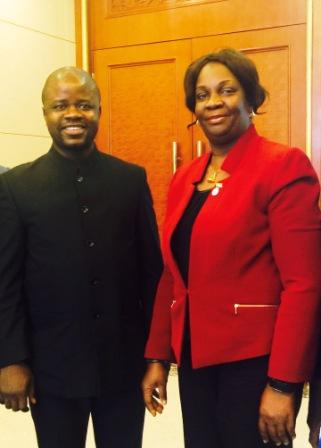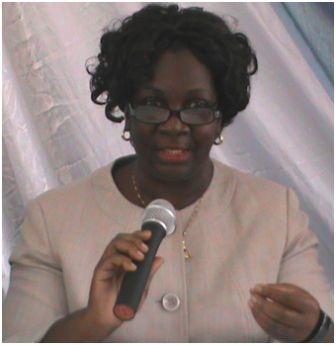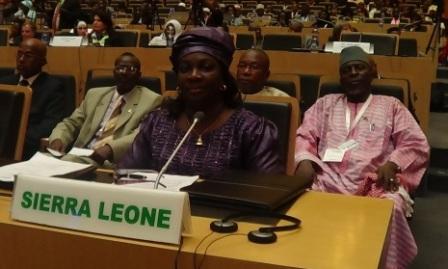Sierra Leone’s Deputy Health Minister I
opens up on South-South Cooperation, Post Ebola Recovery and Capacity Building in the Health Sector
Sierra Leone is recovering from the impact of the Ebola Virus Disease outbreak which struck in mid 2014. Before Ebola, the country had made steady progress towards a number of the Millennium Development Goal targets in the health and nutrition sectors like reduction in child and maternal mortality. A 2014 National Nutrition Survey also confirmed major improvements in levels of under-nutrition. (Ref: Sierra Leone Ebola Recovery Strategy).
The health sector, notwithstanding the successes scored, has been faced with a number of challenges. In fact due to Ebola, by January 2015, a total of 296 health care workers were known to have been infected with the virus with 221 deaths (74.6 percent). The outbreak, health experts believe, led to a decline in the use of health care facilities for non-Ebola related health needs across the country.
But all is not lost for the Government has remained committed to fixing the challenges as well as ensuring a resilient health sector, according to the post Ebola recovery plan. Greater attention has been given to the sector by Government, all in a bid to have a robust and effective health care delivery across the country.
Madam Madina Rahman is the country’s Deputy Minister of Health and Sanitation1. She just attended the Ministerial Strategic Dialogue on South-South Cooperation for Population and Development and the 28th Executive Committee Meeting of Partners in Population and Development (PPD),in Beijing, China.
At the close of the meetings, I caught up, and spoke with her on a range of national issues. First was her reaction to the just concluded meetings:
Deputy Minister: The meetings were good. They enabled us to see where our needs are going to be addressed and from what area. This is more so because we already know where our gaps are as a country, and what countries are going to be able to assist us together in a collaborative manner within the South-South Cooperation. They asked what we are looking for as a country. And what we are looking for is capacity building on all folds, especially health care. That has to be strengthened. That is going to help us largely know where all our gaps are, solidify the base which has been lacking for a while .If the base is not strong, we can’t build anything on top of it. We could build all the hospitals, all the labs, but if we do not have a proper human resource capacity for health, we cannot move from one point to another. With a proper human resource capacity, you could be able to build a resilient health sector. So, that is one area we are looking at.
Were there specific commitments to support or intervene in Sierra Leone?
Yes, we had commitments of 300 scholarships for Sierra Leone in terms of strengthening our human resource. So we now have to decide what areas we want to utilize such opportunities on. I have asked Dr. Babatunde Osotimehin, UN Under Secretary General and Executive Director of UNFPA what else they can offer us in terms of data collection because UNFPA was one sponsor of the census process. He has given indication of helping. We discussed how we get to ICT versus this tradition pen and paper way of data collection. We want to play catch-up in getting accurate data.
Again, in line with the South-South Cooperation development framework, what other areas could the Chinese come in, beyond short term trainings for health workers?
We have tremendous opportunities now. Countries need us more than we need them for now. What should we look at? Okey, say they want to try their vaccines, they want to do research, etc, this is an opportune time for research and studies .When polio was out, that was what they did, when smallpox was out they did same. So with ebola outbreak, this is an opportunity. But how do we build ourselves as a nation from these opportunities? That is the area we should be looking at in terms of long term trainings. It is not enough for a week or month training. It is all good but we need areas for sustainable interventions and see what we can put in place. We have to do it now .We should not wait, we should start now. They have seen the opportunity in us. I think we should now see that opportunity in ourselves.
Let us look at Ebola. What lessons did we learn given the adverse effect it had on us?
Yes, we can Assess, Diagnose, plan but fall short on implementation. We have to move away from that. Inasmuch as it is a major setback for our country, ebola gave us the opportunity to see the gaps we have and ways we can strengthen them. We have seen deeper, how fragile the health care system is. Those basic things we take for granted- healthcare, water and sanitation are key .We are quick to go back to our old ways as things get better. All what we did during ebola that made us get to zero should continue if we should maintain a resilient zero. They should be part of us. Even countries with one or two cases have made it part of them.Countires with no case have made it part of them also.
Ebola would not go away completely. It would not. Let us don’t be in denial. Cases would flare up every now and then but how we address such cases will be key. For instance, are we going to isolate those places? What systems are going to be put in place? Etc. Now we have the Emergency Operational Center. So in case anything happens, we know who should go there, and what should be done, etc, etc.
Are the Holding and Treatment Centers across the country still operational or they have all been shut down?
Not all are operational now since it takes a lot of money to keep them operational. We have regional ones that have skeleton staffs that are going to be there whether there is a case or not. In fact another thing we have been discussing is the need for cross border collaboration to be strengthened. This is because of our geographical locations. What we are looking for is having a major infectious disease facility at the border areas. So if anything is to happen, we won’t be crisscrossing patients into the various countries.
The Hastings Treatment Center was a success story in the eyes of many given number of discharges we had from there. What was responsible for that?
A number of reasons. The nationals have more sympathy and feelings for they would not see one of their own die. They did all they could and they were trained. We insisted that it was to be managed by nationals so we could see what we could achieve. When ebola struck, we were given figures of people that were going to die. But how would you know the number of people going to die? Nobody should know except God. As a health professional myself, I looked at the need to try symptomatic care. I was putting PPEs on myself. It was scary, but I had to. People were dying and we had no facilities.
We had to open it and started with five patients. By the time we could imagine, when we opened it and started seeing successes, people started coming to offer help –those we had asked to help us open the Center but refused earlier. All we needed was to give confidence to the health professionals. So if they see me as Minister putting on PPEs, it would give confidence and would give me an opportunity to also see what was going wrong and be able to teach them in the process. We also ensured someone was there to watch them in every step they took. This is because that was when people come in contact with the virus as they doff off the PPEs. All those systems were put in place and we took care of them like we did with the infected patients. There was no magic at Hastings 1 and 2.The only thing they told us was not to give Intravenous Fluids. But we did!
What about the intervention of the country’s traditional partners as compared to others?
Our traditional partners were sluggish initially. I don’t know the reasons- perhaps because they themselves didn’t understand the virus. But it was crisis and that was not the time to be sluggish. Our nontraditional partners like the Chinese, the Ghanaians, the Gambians, etc stepped in. They were able to provide what we needed at that moment. Initially what we used for the outbreak was all government funded and what was contributed by our nationals who did well also in the form of contributions. We should not forget that. Everybody supported.
Are we trying to get our health professionals in the Diaspora back home as a way of achieving a resilient health sector?
We indeed as a country have capacity out in the Diaspora. We have to make the country suitable enough for them to come. If we are making it conducive for experts to come and give them contracts and see that after their contracts they leave, that is not capacity building until we attract our own professionals. We have to make the country conducive enough. With a fraction of the cost on experts, I believe they would come and be able to impact on the country .Skills transfer is what we should stress on, in every area. Whoever is coming to help should help build capacity and skills for our nationals. Every expert that comes in the country should be able to transfer skills to at least four of our nationals, not just for health but in every area.
So what is being done in that direction more so in getting back our health experts?
We are sourcing Sierra Leoneans in the Diaspora. How could we regain their confidence back, bring them in and try to make it conducive as we do it for non nationals that are coming? We can do a quick survey and see the things that nationals would want to see in place for them to return. We could strengthen our Diaspora Office to the point where, if I am in the ministry of transport for example and I need two engineers, I should be able to call the Diaspora Office and ask them to check their Data Base and see the people who would want to come as engineers and be able to access them.
And how do we encourage those currently in the country so as to give more professional hours in the medical and healthcare system?
We need to work on non financial retention benefits for our current healthcare professionals, career pathways and mandatory continuing educational program. Going forward, we can also revisit the salary scale of our health care professionals.
How has the ministry often coped with what is needed to that brought in by donors?
We need the partners but at the same time we need to prioritize our needs versus their own because they may not align. If you are coming to help, it should be in line with what our needs are. It is time for us to look deeper as a nation because we are now going for the Sustainable Development Goals-SDG. We should not be continuously looking for hand outs, but rather for ways to sustain ourselves.
A pleasure, talking to you Madam Minister.
Thank you.
Endnote: Madam Madina Rahman has left for Sierra Leone. From the 22-24 March 2016, a technical team from Sierra Leone’s Ministry of Health and Sanitation will also be attending a meeting on China–Africa Development Cooperation for Child Health. It is a follow-up discussion to the Summit of the Forum on China-Africa Cooperation and the China-Africa Health Ministers meeting in 2015 when a commitment was made to “make resources and solutions available to address major causes of preventable maternal, newborn and child mortality” which continue to be high in Africa.
Stay with Sierra Express Media, for your trusted place in news!
© 2016, https:. All rights reserved.






